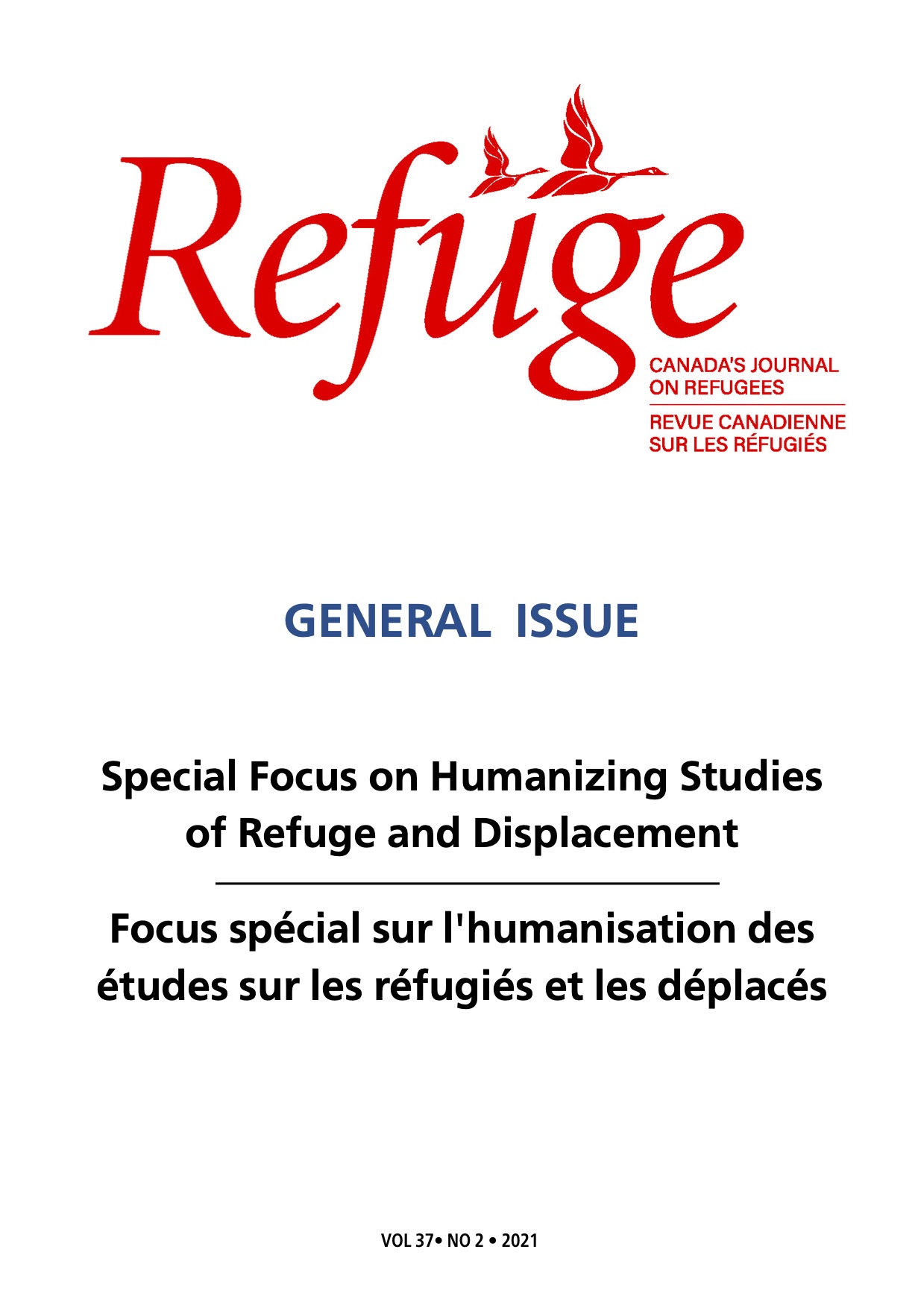What Does a Humane Infrastructure for Research Look Like?
DOI :
https://doi.org/10.25071/1920-7336.40781Mots-clés :
refugee research, migration studies, humanization, ethics, research hot spots, interdisciplinary researchRésumé
Dans cette intervention, je fais deux suggestions principales pour humaniser la recherche sur les réfugiés. Premièrement, la tendance à choisir des points comme terrains de recherche - où les chercheur.es approchent souvent les mêmes répondant.es et les mêmes espaces - doit être non seulement dénoncée et évitée, mais aussi combattue. Deuxièmement, je suggère que la recherche sur les réfugiés devrait s’effectuer en collaboration directe avec d’autres champs d’études portant sur des phénomènes sociaux, politiques et économiques afin d’éviter de faire du déplacement la condition sine qua non de la recherche, mais plutôt l’une des nombreuses conditions qu’un être humain peut vivre au sein des sociétés d’accueil. La poursuite de cet objectif sera plus facile si les études sur la migration forcée ne se compartimentent pas et ne se développent pas en vase clos par rapport aux autres disciplines et groupes de recherche.
Statistiques
Références
Bakewell, O. (2008). Research beyond the categories: The importance of policy irrelevant research into forced migration. Journal of Refugee Studies, 21(4), 432–453. https://doi.org/10.1093/jrs/fen042
Block, K., Warr, D., Gibbs, L., & Riggs, E. (2013). Addressing ethical and methodological challenges in research with refugee-background young people: Reflections from the field. Journal of Refugee Studies, 26(1), 69–87. https://doi.org/10.1093/jrs/fes002
Bouris, E. (2007). Complex political victims. Kumarian Press.
Carpi, E., & Fiddian-Qasmiyeh, E. (2020). Keeping the faith? Examining the roles of faith and secularism in Syrian diaspora organizations in Lebanon. In D. Dijzkeul & M. Fauser (Eds.), Diaspora organizations in international affairs (pp. 129–149). Routledge. https://doi.org/10.4324/9780429491849-7
Clark-Kazak, C. (2019). Developing ethical guidelines for research. Forced Migration Review, 61, 12–14. https://www.fmreview.org/ethics/clarkkazak
Di Peri, R., & Carpi, E. (2020). Le Liban et la recherche internationale après les révoltes de 2011: « Une zone de confort »? Afriche e Orienti, 11(2), 107–124. https://doi.org/10.23810/1345.DIPERI-CARPI
Duffield, M. (2012). Challenging environment: Danger, resilience and the aid industry. Security Dialogue, 43(5), 475–492. https://doi.org/10.1177/0967010612457975
Fiddian-Qasmiyeh, E. (Ed.) (2020). Refuge in a moving world: Tracing refugee and migrant journeys across disciplines. UCL Press.
Foley, D. E. (2002). Critical ethnography: The reflexive turn. Qualitative Studies in Education, 15(5), 469–490. https://doi.org/10.1080/09518390210145534
Gunel, G., Varma, S., & Watanabe, C. (2020, June 9). A manifesto for patchwork ethnography. Member Voices, Fieldsights. https://culanth.org/fieldsights/a-manifesto-for-patchwork-ethnography
Koen, J., Wassenaar, D., & Mamotte, N. (2017). The “over-researched community”: An ethics analysis of stakeholder views at two South African HIV prevention research sites. Social Science & Medicine, 194, 1–9. https://doi.org/10.1016/j.socscimed.2017.10.005
Krause, U. (2017). Researching forced migration: Critical reflections on research ethics during fieldwork. (RSC Working Paper Series, no. 123). Refugees Study Centre. https://www.rsc.ox.ac.uk/publications/researching-forced-migration-critical-reflections-on-research-ethics-during-fieldwork
Maqul, S. A., Gunes, S., & Akin, T. (2020). The comparative analysis of life satisfaction among Syrian, Iranian, and Afghan refugees in Turkey: The case of Denizli. Journal of Refugee Studies, 34(2), 2376–2393. https://doi.org/10.1093/jrs/feaa055
Monsutti, A. (2010). The contribution of migration studies and transnationalism to the anthropological debate: A critical perspective. In C. Aubert & M. K. Doraï (Eds.), Migration in a globalised world: New research issues and prospects (pp. 107–125). Amsterdam University Press.
Nayel Ali, M. (2013, May 17). Palestinian refugees are not at your service. The Electronic Intifada. https://electronicintifada.net/content/palestinian-refugees-are-not-your-service/12464
Pascucci, E. (2017). The humanitarian infrastructure and the question of over-research: Reflections on fieldwork in the refugee crises in the Middle East and North Africa. Area, 49(2), 249–255. https://doi.org/10.1111/area.12312
Somers, M. R. (1992). Narrativity, narrative identity, and social action: Rethinking English working-class formation. Social Science History, 16(4), 591–630. https://doi.org/10.2307/1171314
Spivak, G. (1988). Can the subaltern speak? In C. Nelson & L. Grossberg (Eds.), Marxism and the interpretation of culture (pp. 271–313). Macmillan.
Sukarieh, M., & Tannock, S. (2012). On the problem of over-researched communities: The case of the Shatila Palestinian refugee camp in Lebanon. Sociology, 47(3), 494–508. https://doi.org/10.1177/0038038512448567
Tejel, J., & Hakki Öztan, R. (2020). Towards connected histories of refugeedom in the Middle East. Forced Migration and Refugeedom in the Modern Middle East [Special issue]. Journal of Migration History, 6, 1–15. https://doi.org/10.1163/23519924-00601002
Téléchargements
Publié-e
Versions
- 2021-11-22 (2)
- 2021-11-22 (1)
Comment citer
Numéro
Rubrique
Licence
© Estella Carpi 2021

Cette œuvre est sous licence Creative Commons Attribution - Pas d'Utilisation Commerciale 4.0 International.
Les auteurs qui publient dans Refuge conservent le droit d’auteur associé à leur œuvre, et octroient au public une licence Creative Commons Attribution - Utilisation non commerciale 4.0 International. La licence permet l’utilisation, la reproduction et l’adaptation du matériel avec attribution par tous moyens et sous tous formats pour des fins non commerciales. Pour des informations générales sur les licences Creative Commons, visitez le site Creative Commons. Pour la licence CC BY-NC 4.0, consultez le résumé lisible par l'homme.







